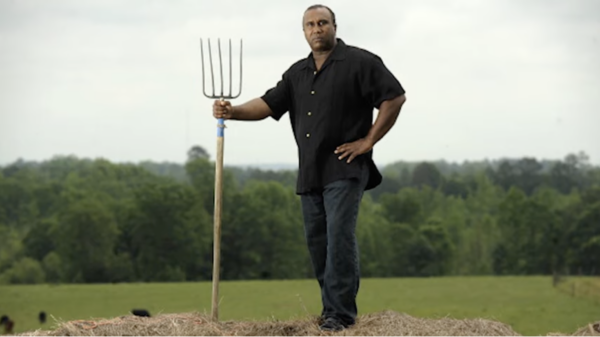Black people had the largest amount of farmland they would ever own in the U.S. after the Civil War, but decade after decade, that land has been stripped through discrimination policies and theft, leading to hundreds of billions of dollars in economic loss in the 20th century, a new report shows.
According to the report published on May 5, after slavery, 425,000 Black families had nearly 20 million acres of farmland in the South by 1910. They have since lost 14 million acres, often at the hands of the U.S. Department of Agriculture.
The land lost and the possible income the land could have produced for Black farmers between 1920 and 1997 total $326 billion, economists estimate.

Authors of The New Republic report say it does not account for the investments the families could’ve made in their children’s educational attainment. Black farmers were stripped of their rights, dignity, aspirations and other personal freedoms, the report shows.
Still, John Boyd Jr., president and founder of the National Black Farmers Association, said only those who have experienced the loss could say what it is truly worth to them.
“You can’t put a value on land loss,” Boyd said. “I have people come to my farms all the time and try to tell me what they’re worth, but I know what it’s worth to me.”
He continued, “It’s very hard to put a number on land loss and generational wealth because that’s what that is. And that’s what happened to us. We’ve lost just about all of our land.”
Land loss plays a significant role in the nation’s Black-white wealth gap, the report says. A Center for American Progress report shows that the average Black family had 14.5 percent of the wealth or $838,220 less than the average white family in 2019.
If the more than $300 billion from the land loss study was distributed, the authors estimate that the median household in all Black households would nearly double, from $21,000 to $37,000.
The group of economists and law experts who wrote the report named former Democratic U.S. Rep. Jaime Whitten of Mississippi the figure behind discriminatory policies that led to Black owners’ farmland dispossession.
Whitten, chairman of the Appropriations Subcommittee on Agriculture for 53 years, was known as the “Permanent Secretary of Agriculture.”
Whitten used his power to control USDA staffing, the report says. He cut funding for projects to help Black people in the South, including studies on rural economic and racial disparities and Black sharecroppers, food programs and tractor driving courses for Black workers.
The researchers also point to the New Deal from the 1930s with policies that fueled white, industrialized farms with subsidies and iced out Black farms, making it hard to compete.
Lawmakers who backed the plan slammed President Franklin D. Roosevelt’s Farm Security Administration, created to help small farmers. They said funding for large farmers benefited “general welfare,” while the FSA programs made small farmers dependent on the government.
Discriminatory lending policies made it harder for Black farms to secure funding and hold onto land. The USDA imposed agricultural restrictions on Black farmers that closed down certain farmers.
In some instances, USDA agents would delay paying out loans after farmers put up land for collateral. As a result, Black farmers reportedly have nicknamed the federal agency “the Last Plantation.”
Boyd, a fourth-generation farmer in Virginia, had to file bankruptcy after being denied a federal loan in the 1980s. In the late 1990s, he lost a farm through a USDA auction.

An agent told Boyd he’s “just going to have to sell him out” because Boyd refused to sign over his 44-acre farm to a bigger farm. He was at risk of losing another farm, but after he and other Black farmers protested, then-Secretary of Agriculture Dan Glickman ordered a moratorium on government farm foreclosures.
Black farmers have banded together to fight discrimination and save Black farmland through the years. They started forming cooperatives in the late 1960s and 1970s to put together funds to rescue farms.
In 1999, they agreed to a class-action settlement in a discrimination lawsuit that paid out $2.3 billion by 2010, but many argued that the settlement did not touch the surface of the issue. In addition, some farmers reported having difficulty getting a part of the award.
President Joe Biden’s America Rescue Plan set aside nearly $5 billion in debt relief for “socially disadvantaged” farmers. However, multiple lawsuits have been filed, temporarily blocking payments.
The authors of the report, titled “How the Government Helped White Americans Steal Black Farmland,” hope it would be a start to the federal government making Black farmers whole.
Duke economist William Darity Jr. said the estimate should be included in a broader national reparations program for Black Americans. According to Darity, the federal government owes descendants of enslaved African-Americans $14 trillion.
“What has happened to the Black farmers is part of the fabric of a host of atrocities that have been inflicted on Black Americans frequently involving the dispossession of land,” Darity said.
“So, the answer is not to attempt to address this on a piece-by-piece basis or atrocity by atrocity, but actually for all the communities of Black people that have been harmed by America’s history of racism to come together to insist upon a national program of reparations.”
Boyd said he hopes the report motivates Black America to support farmers. Black farmers need the backing of the community to keep fighting discrimination and the dispossession of their land, he said.
Boyd also hopes it will encourage more Black people to invest in farms and land, the greatest source of wealth in America.
“Don’t let that stop us from being landowners. Hold on to the land, at any cost,” Boyd said. “Don’t let it leave your hands because if it gets away from you, it’s hard to get back. It’s not like a car or job. Hold onto to the land at any cost.”


